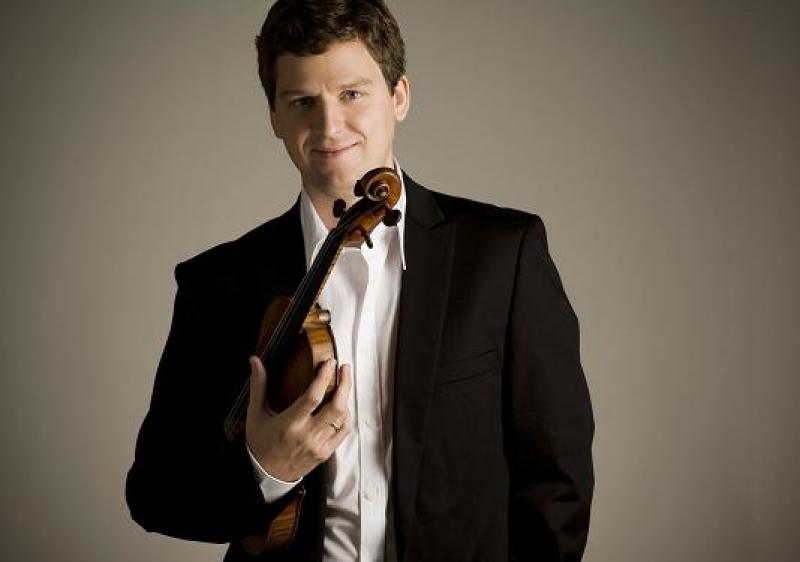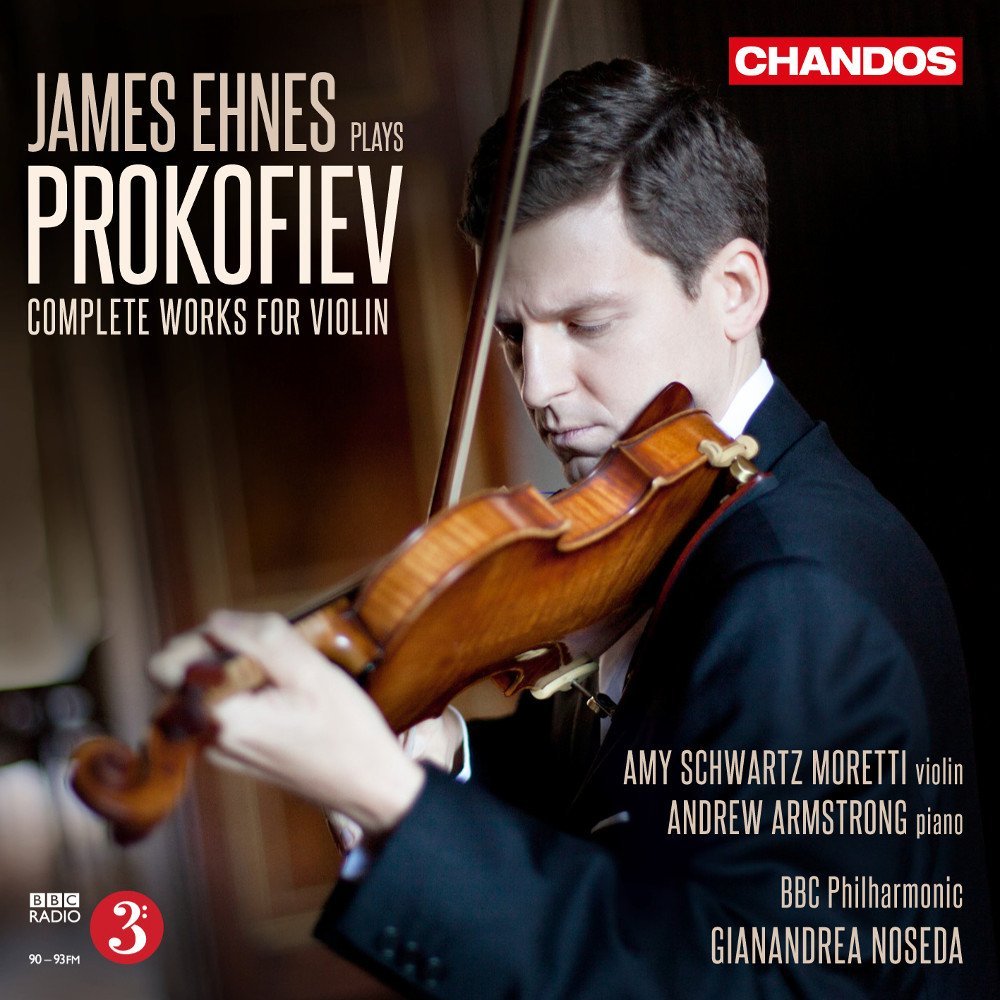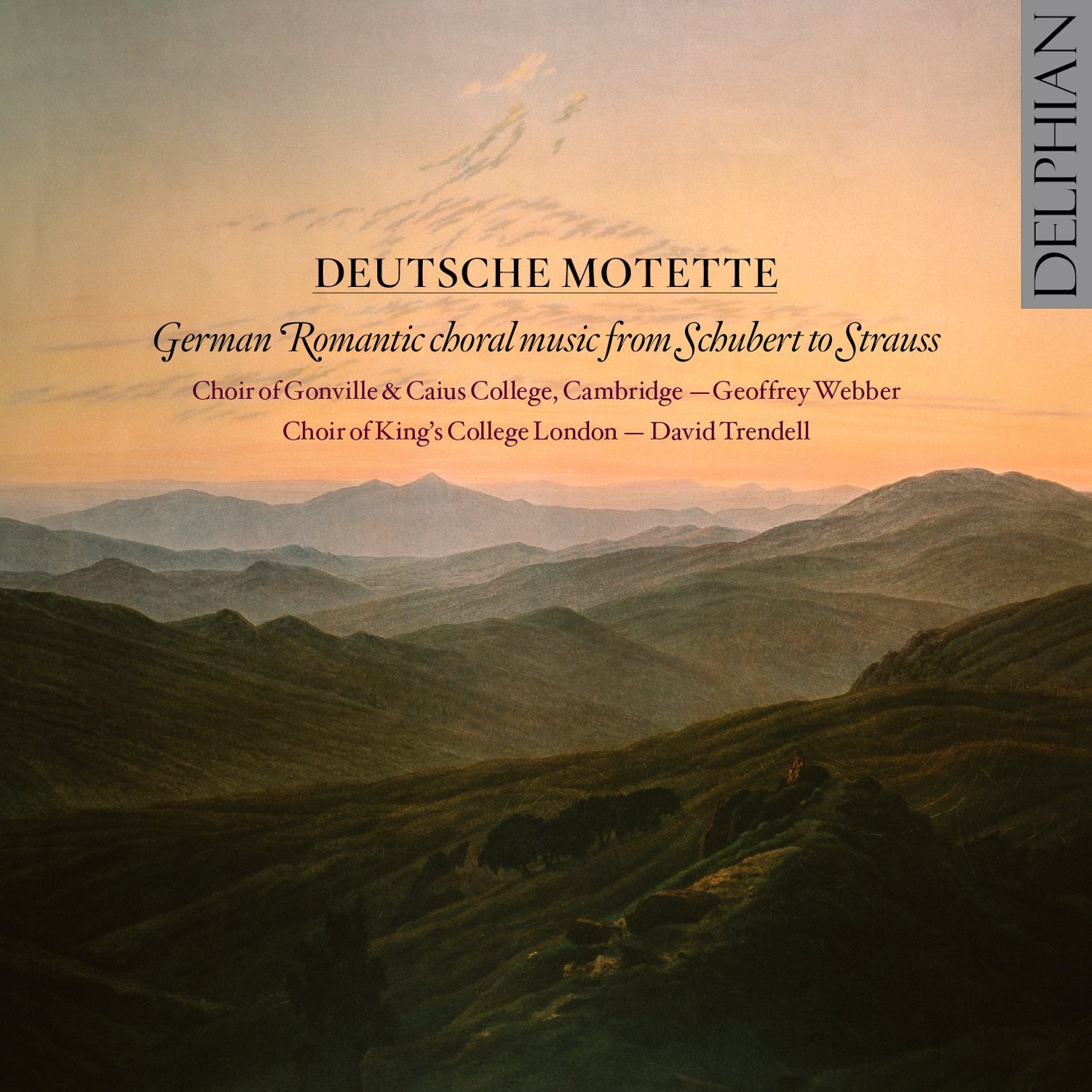Classical CDs Weekly: Elgar, Prokofiev, Deutsche Motette | reviews, news & interviews
Classical CDs Weekly: Elgar, Prokofiev, Deutsche Motette
Classical CDs Weekly: Elgar, Prokofiev, Deutsche Motette
Extreme Elgar, an essential violin anthology and rich acapella choral music

 Elgar: Enigma Variations, Rehearsal documentary BBC Symphony Orchestra/Leonard Bernstein (ICA Classics DVD)
Elgar: Enigma Variations, Rehearsal documentary BBC Symphony Orchestra/Leonard Bernstein (ICA Classics DVD)
Leonard Bernstein’s DG recording of Elgar’s Enigma ruffled a few feathers when it appeared in the early 1980s. This ICA Classics DVD is a much better option – the accompanying live performance recorded with the BBC Symphony Orchestra in the Royal Festival Hall in April 1982 with good sound and a decent image, and the rehearsal footage which was shown on BBC Two a few days later. Director Humphrey Burton points out in his booklet note that Bernstein in his final decade tended towards extremes of tempi. Elgar’s theme, and the slower variations, are far weightier than usual. Nimrod is astonishingly protracted, but works beautifully. Watching Bernstein conduct was always entertaining, and the physical contortions and facial expressions are mesmerising here. And he draws a wonderfully rich, dark sound from the BBC players. The faster variations are thrilling, and you’ll forgive the over-ripe, extended final note.
Even more entertaining is Humphrey Burton’s rehearsal documentary. The orchestral players were already annoyed by Bernstein’s late arrival, and you can sense the irritation through watching their facial expressions and body language. Witness a tense confrontation with the orchestral trumpets, and you wonder how the partnership survived past the first hour. “It just feels impossible!” moans leader Rodney Friend at one point. As a bonus, there’s a clunky interview between Bernstein and Barry Norman. Norman looks distinctly overwhelmed, perhaps worried that the precarious column of ash forming at the end of Bernstein’s smouldering cigarette will topple onto his piano keyboard. Fans of early 1980s hairstyles and fashion design will also find much to entertain. Compulsive viewing, despite the short running time.
 Prokofiev: Complete works for violin James Ehnes with Amy Schwartz Moretti, Andrew Armstrong, BBC Philharmonic/Gianandrea Noseda (Chandos)
Prokofiev: Complete works for violin James Ehnes with Amy Schwartz Moretti, Andrew Armstrong, BBC Philharmonic/Gianandrea Noseda (Chandos)
Wow. Everything works here. James Ehnes rarely disappoints, and the playing on this beautifully recorded two-disc set is immaculate. It’s not just the musicality, the remarkable ability to give shape and colour to the thorniest solo writing, but his modesty – he’s a player who knows exactly when to step back and let collaborators take the spotlight. You hear that in these readings of the two Prokofiev violin concertos. Ehnes begins the Concerto No 1’s rapturous cantilena with nonchalant grace. The effect is totally unselfconscious, and the same thing happens in the G minor concerto’s Andante assai, as if Ehnes doesn’t want to shift attention away from Prokofiev’s quirky staccato clarinet line. It helps that the accompaniments are so idiomatic – Gianandrea Noseda’s lithe, lean-toned BBC Philharmonic are superb partners. Listen to the quirky tick-tocking which opens the first concerto’s final movement and marvel at how Ehnes floats slyly above. Both performances are fabulous, and among the best you’ll hear.
What makes this set essential are the couplings; we get all of Prokofiev’s solo violin music. The Op 56 Sonata for two violins has Ehnes teamed with Amy Schwartz Moretti. The music’s clean, neo-classical contours are boldly projected, and there’s a rare sense of fun. The late Sonata for Solo Violin is also enjoyable – Prokofiev’s style distilled to its essence, though I’m curious to hear what it would sound like played by a class of violinists in unison. The two contrasting sonatas for violin and piano come across beautifully, Ehnes managing to find much-needed warmth in the chilly F minor work, and revelling in the purer lyricism of the D major sonata, a recasting of a solo flute work. Andrew Armstrong’s piano backings are a model of sensitivity, and we’ve light relief in the form of Prokofiev’s Op 35bis Five Melodies, a sequence of highly approachable song transcriptions. Informative, lucid notes by theartsdesk’s David Nice. Unmissable.
 Deutsche Motette – German romantic choral music from Schubert to Strauss Choir of Gonville & Caius College, Cambridge, Choir of King’s College London/Geoffrey Webber (tracks 2-8) and David Trendell (tracks 1, 9-11)
Deutsche Motette – German romantic choral music from Schubert to Strauss Choir of Gonville & Caius College, Cambridge, Choir of King’s College London/Geoffrey Webber (tracks 2-8) and David Trendell (tracks 1, 9-11)
Richard Strauss isn’t well-known as a choral composer. His Deutsche Motette is an expansive setting of a poem by Friedrich Rückert and it's as harmonically ripe as you’d expect. It dates from 1913, when the composer was working on the Alpine Symphony. And it’s the sophistication which ultimately becomes a little wearisome, with the acapella choral writing so rich, so fruity that it becomes overpowering. Strauss’s quiet close is fabulous, but the music can’t help feeling overwrought, and the overripe acoustic muddies the waters yet further. Which isn’t to disparage this performance – it’s brimming with secure confidence, the combined choral forces producing a glorious sound under David Trendell. The other works on the disc are easier to assimilate; Schumann’s dazzling Vier doppelchörige Gesänge sounding dazzlingly straightforward by comparism. The last two songs are particularly enjoyable, blending Schumann’s warmly approachable style with sophisticated choral technique.
There’s a nicely creaky fortepiano accompanying Schubert’s Gott ist mein Hirt – a predominantly light, airy setting. Brahms’s O Heiland, reiss die Himmel auf is darker, weightier stuff, leavened by brilliant contrapuntal writing. Again, the performance is wonderful, each line clearly delineated by conductor Geoffrey Webber. More novelties are provided in the form of Josef Rheinberger’s Abendlied, a rather stolid motet, and Peter Cornelius’s Liebe, comprising three richly harmonised numbers celebrating divine love.
Explore topics
Share this article
The future of Arts Journalism
You can stop theartsdesk.com closing!
We urgently need financing to survive. Our fundraising drive has thus far raised £49,000 but we need to reach £100,000 or we will be forced to close. Please contribute here: https://gofund.me/c3f6033d
And if you can forward this information to anyone who might assist, we’d be grateful.

Subscribe to theartsdesk.com
Thank you for continuing to read our work on theartsdesk.com. For unlimited access to every article in its entirety, including our archive of more than 15,000 pieces, we're asking for £5 per month or £40 per year. We feel it's a very good deal, and hope you do too.
To take a subscription now simply click here.
And if you're looking for that extra gift for a friend or family member, why not treat them to a theartsdesk.com gift subscription?
more Classical music
 Appl, Levickis, Wigmore Hall review - fun to the fore in cabaret and show songs
A relaxed evening of light-hearted fare, with the accordion offering unusual colours
Appl, Levickis, Wigmore Hall review - fun to the fore in cabaret and show songs
A relaxed evening of light-hearted fare, with the accordion offering unusual colours
 Lammermuir Festival 2025, Part 2 review - from the soaringly sublime to the zoologically ridiculous
Bigger than ever, and the quality remains astonishingly high
Lammermuir Festival 2025, Part 2 review - from the soaringly sublime to the zoologically ridiculous
Bigger than ever, and the quality remains astonishingly high
 BBC Proms: Ehnes, Sinfonia of London, Wilson review - aspects of love
Sensuous Ravel, and bittersweet Bernstein, on an amorous evening
BBC Proms: Ehnes, Sinfonia of London, Wilson review - aspects of love
Sensuous Ravel, and bittersweet Bernstein, on an amorous evening
 Presteigne Festival 2025 review - new music is centre stage in the Welsh Marches
Music by 30 living composers, with Eleanor Alberga topping the bill
Presteigne Festival 2025 review - new music is centre stage in the Welsh Marches
Music by 30 living composers, with Eleanor Alberga topping the bill
 Lammermuir Festival 2025 review - music with soul from the heart of East Lothian
Baroque splendour, and chamber-ensemble drama, amid history-haunted lands
Lammermuir Festival 2025 review - music with soul from the heart of East Lothian
Baroque splendour, and chamber-ensemble drama, amid history-haunted lands
 BBC Proms: Steinbacher, RPO, Petrenko / Sternath, BBCSO, Oramo review - double-bill mixed bag
Young pianist shines in Grieg but Bliss’s portentous cantata disappoints
BBC Proms: Steinbacher, RPO, Petrenko / Sternath, BBCSO, Oramo review - double-bill mixed bag
Young pianist shines in Grieg but Bliss’s portentous cantata disappoints
 theartsdesk at the Lahti Sibelius Festival - early epics by the Finnish master in context
Finnish heroes meet their Austro-German counterparts in breathtaking interpretations
theartsdesk at the Lahti Sibelius Festival - early epics by the Finnish master in context
Finnish heroes meet their Austro-German counterparts in breathtaking interpretations
 Classical CDs: Sleigh rides, pancakes and cigars
Two big boxes, plus new music for brass and a pair of clarinet concertos
Classical CDs: Sleigh rides, pancakes and cigars
Two big boxes, plus new music for brass and a pair of clarinet concertos
 Waley-Cohen, Manchester Camerata, Pether, Whitworth Art Gallery, Manchester review - premiere of no ordinary violin concerto
Images of maternal care inspired by Hepworth and played in a gallery setting
Waley-Cohen, Manchester Camerata, Pether, Whitworth Art Gallery, Manchester review - premiere of no ordinary violin concerto
Images of maternal care inspired by Hepworth and played in a gallery setting
 BBC Proms: Barruk, Norwegian Chamber Orchestra, Kuusisto review - vague incantations, precise laments
First-half mix of Sámi songs and string things falters, but Shostakovich scours the soul
BBC Proms: Barruk, Norwegian Chamber Orchestra, Kuusisto review - vague incantations, precise laments
First-half mix of Sámi songs and string things falters, but Shostakovich scours the soul
 BBC Proms: Alexander’s Feast, Irish Baroque Orchestra, Whelan review - rapturous Handel fills the space
Pure joy, with a touch of introspection, from a great ensemble and three superb soloists
BBC Proms: Alexander’s Feast, Irish Baroque Orchestra, Whelan review - rapturous Handel fills the space
Pure joy, with a touch of introspection, from a great ensemble and three superb soloists
 BBC Proms: Moore, LSO, Bancroft review - the freshness of morning wind and brass
English concert band music...and an outlier
BBC Proms: Moore, LSO, Bancroft review - the freshness of morning wind and brass
English concert band music...and an outlier

Add comment